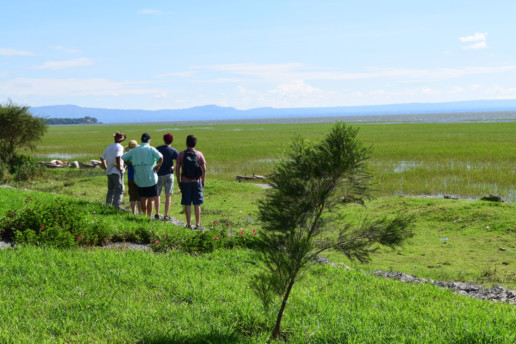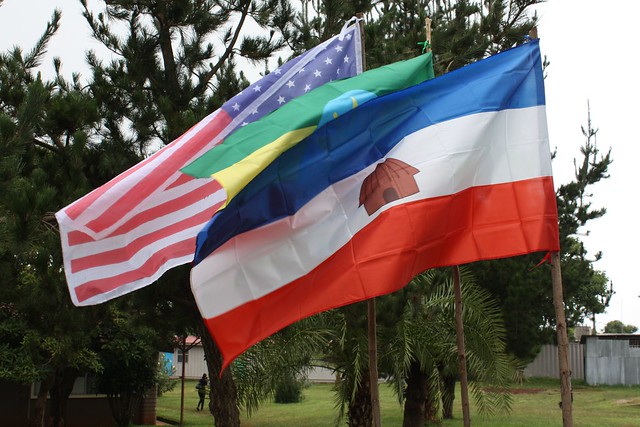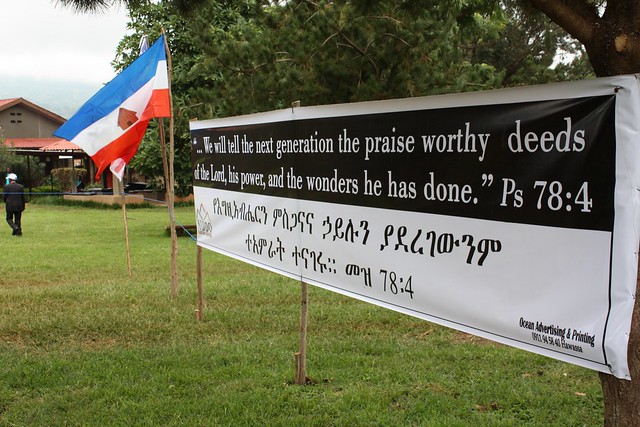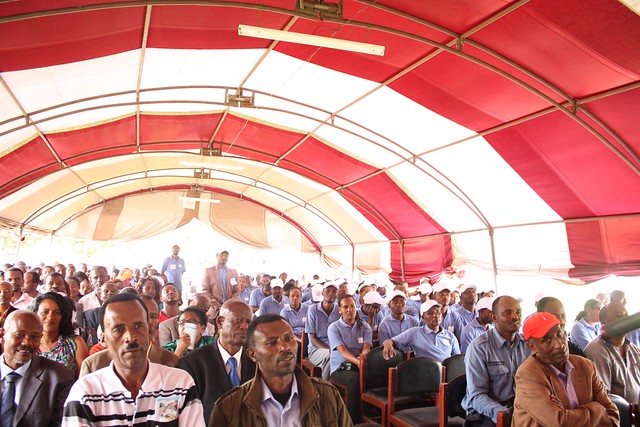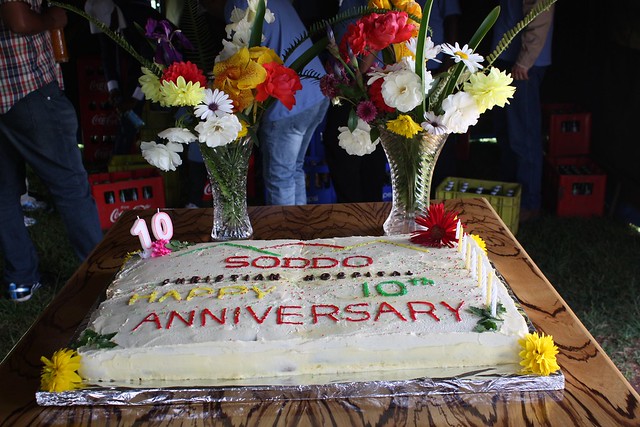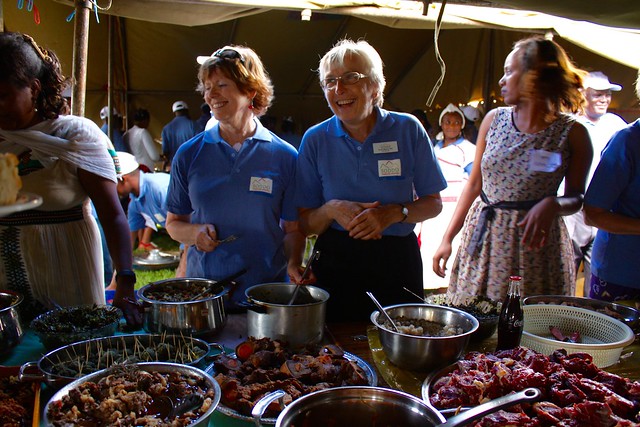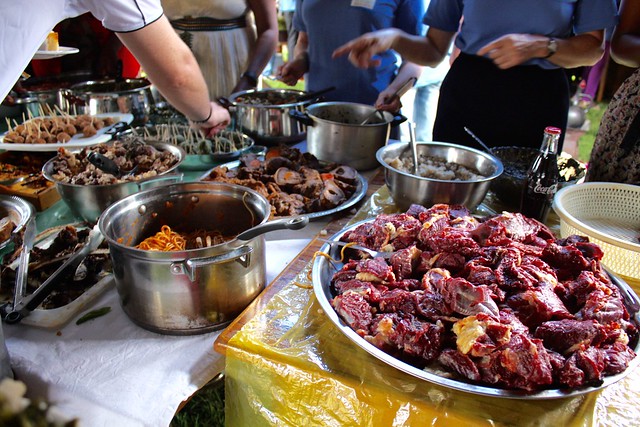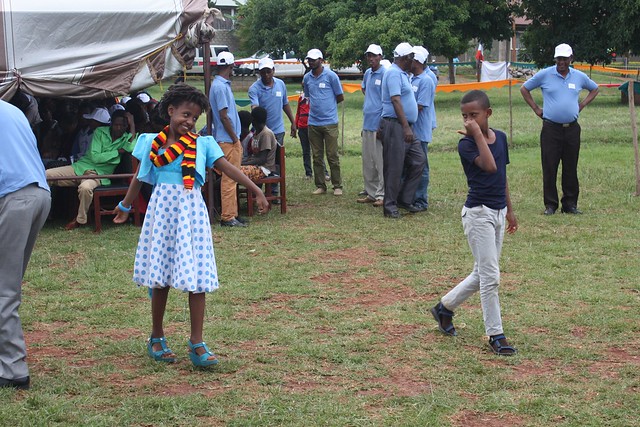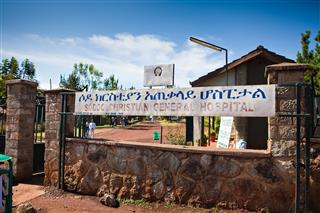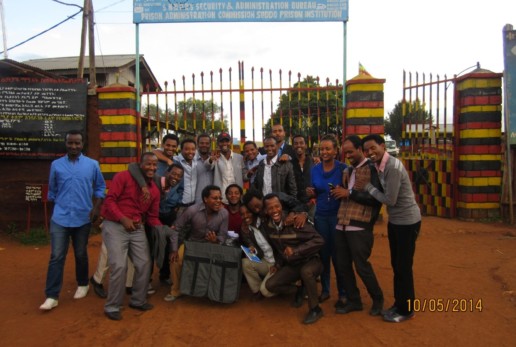National Maternal Mortality rate has been cut in half!

We have had some wonderful success stories as well with the delivery of one mother six weeks early who also had preeclampsia but has gone home with a live baby. Dr. Ross has been a Godsend to us. We also have a new GP, named Dr. Sifora. She has spent the past month with me in OB and has been a wonderful asset to me. She is a recent graduate of medical school in the Philippines and would like to become an OB/GYN in the future. Dr. Sheryl Ross has her PhD in leadership and has been giving leadership training to our nursing, administration and chaplain staff.
We are very grateful that Dr. Nate Ross, an OB/GYN from Alabama, and his wife Sheryl are spending this month helping us out.
You know you’re a missionary in Africa when . . .
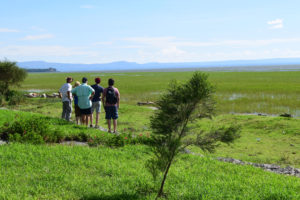 We’re guessing that some of you reading this were probably fans of the Late Show with David Lettermen. Each Late Show would end with a goofy “top ten” list (“Ten Reasons that Captain Kangaroo should be president of the United St.ates, that sort of thing). As part of our newsletter today, we’ve decided to do our own top ten list. Well, actually it’s a top eight list, because we felt like ten was a little too long-winded. So today we proudly present to you “Eight Ways to Know You’re A Missionary in Africa.”
We’re guessing that some of you reading this were probably fans of the Late Show with David Lettermen. Each Late Show would end with a goofy “top ten” list (“Ten Reasons that Captain Kangaroo should be president of the United St.ates, that sort of thing). As part of our newsletter today, we’ve decided to do our own top ten list. Well, actually it’s a top eight list, because we felt like ten was a little too long-winded. So today we proudly present to you “Eight Ways to Know You’re A Missionary in Africa.”
We find humor, beauty and faith-building in everything you’re about to read on this list. We hope that it gives you, our faithful friends and supporters, a little bit of a behind-the-scenes peek into what life is like on the African mission field.
And now without further adieu, you know you’re a missionary in Africa when:
De-worming isn’t just for your dog. It’s true! Twice a year, every member of the Canfield family takes a yummy little pill that kills off any “friends” our intestines might have picked up (the pill has no side effects). Thankfully, the medicine has worked and we haven’t had any unwanted stomach visitors yet. But worms in Ethiopia are fairly easy to get from fruit and contaminated food. So the next time you pick up worm medicine for your pet, you think can think of us.
Potato chips are one of your most valued treasures. We won’t lie – when we lived in the US, Trader Joe’s potato chips were one of our favorites. No Trader Joe’s here. Sometimes at one of the tiny local stores here we can find a brand of chips called Mr. Potato. They’re basically the African version of Pringles chips, complete in a tall, slender can. When we do find a can of these, the celebration that follows would make you think we just won the lottery. But no, we’re just really excited about a bit of highly processed fat and salt.
Candles aren’t decorations. The power goes out here. A lot. Usually a few times a day. Our longest stretch with no power was four months, as we shared in our last newsletter. So we’ve gotten used to eating, reading,washing dishes, etc. by the light of candles. We were so blessed to have one of our friends and supporters in Oregon send us a gift of a new portable generator for our house. We can get gas to run it a few hours a day during the bad power outages. But our eyes have developed a somewhat cat-like ability to see in the dark.
Your definition of “clean” changes (dramatically). Between power outages and water shortages, showers can be a rarity, especially during the dry season. Jackson and Oliver actually love this, as they’ve never been really big big fans of bathing.
Bugs and reptiles in your house don’t bother you. The variety of animals in Africa is absolutely stunning. There are so many small creatures here that look like they stepped out of a psychedelic dream. The catch is that many of them crawl, fly or slither into our house on a regular basis. It’s not uncommon to grab a dish off the shelf and find a striped lizard sleeping underneath. Or to step out of bed in the morning and disturb a horned beetle slowly making its way across the floor. There’s no way to keep them out, so for the most part we just laugh and admire them (although Brad was not a fan of the black tarantula in our kitchen).
Your morning commute involves dodging donkeys. There’s nothing like traffic in Africa. It’s perhaps comparable to driving through a massive, out-of-control circus – fascinating, amusing and sometimes alarming. Every time we drive from our house to the hospital, we swerve around packs of donkeys (far more numerous than cars), chickens, goats, three-wheeled bajaj taxis, and oceans of people. We praise God after every drive that we didn’t hit anyone or anything.
You take “coffee snob” to a whole new level. In our biased opinion, east Africa produces the best coffee in the world, and Ethiopia is known as the birthplace of coffee. Back in our home state of Oregon, there’s a coffee shop called Stumptown is that at the epi-center of the “coffee snob” culture. The kind of place where people in plaid shirts sit around sipping $10 cups of joe and commenting about “floral notes.” Well, the folks at Stumptown can only dream of sitting on a terrace overlooking the mountains of Ethiopia, drinking coffee that was grown and roasted about a mile down the road on a small farm, and slow-brewed in a jebena pot over a coal fire. The scenes that you see on the big posters in Starbucks, we get to live every day. What can we say, we’re proud of our adopted country!
You believe in miracles, because you see them happen all the time. As Christians living in the US, it was often easy for us to give lip-service to the idea that God works miracles, without fully believing it in our hearts. The blessings of modern medicine and the relative security of living in America often made super-natural intervention in our lives seem unnecessary. It’s different in Ethiopia. Miracles are how people survive here. There’s no rain for months for crops; so the people in our city hold an all-night prayer meeting, and the next day it pours (and the next and the next). Patients come to Soddo Christian Hospital with medical problems that should mean death, with conditions that should be incurable. Our staff pray for them (and also provide great care), and the patients walk out of the hospital healthy. Mysterious, massive tumors disappear. Horrible diseases evaporate into thin air. It’s easy to discount the supernatural when you don’t really need it. Our perspectives have been changed because we do need it. Every day.
Post by: Brad Canfield
The God of Ethiopia
This poem was written by a recent visitor to Soddo Christian Hospital. He wanted to remember his visit and this was the method God gave him for remembering his trip.
Where do we find God in Ethiopia,
Do we find Him in the bright, round eyes of a young boy in the hospital huddled close to his father?
Do we find Him in the quiet tears and prayers of a rounds team telling a patient he is going to die?
Do we find him in the tears of a young doctor fighting for a patient's eyesight and begging for God's providence?
Do we find Him in the sweet vespers hymns of a staff worn down by the cares of the day?
Do we find Him in the soft rain watering a thirsty land?
Yes, He is there!!
But He is also in the hearts of missionary men and women who have answered the call of God in their lives and given Him all they have.
And yes He is in the sweet minds and souls of those native Ethiopia's who have heard and heeded his call to salvation.
The God of Ethiopia permeates the heart and soul of the land.
Listen!
Hear His soft voice and footsteps all around you.
Celebrating God’s mercy and grace
Celebrating God’s mercy and grace
I know I always keep saying this, but seriously the cases I see here never cease to amaze me. Three weeks ago the ER called stating they had a pregnant mother critically ill and would I come right away to the OR because they were transferring her there. The story goes like this. Two weeks earlier she had seen a “native doctor/traditional healer” who had cut out her uvula. The uvula is that small appendage that hangs down the back of one’s throat. He had also cut out her tonsils. She had so much edema from this horrific procedure that her airway was being cut off and she could not breathe. She had been hospitalized at another hospital for seven days and her condition continued to worsen. They had not even realized at the other hospital that she was full term pregnant! The family moved her to SCH as their last hope. When I entered the OR and saw that her O2 saturation was very low and she was gasping for every precious breath, I did not hold out much hope that she could survive. On the OR table it was obvious that she was near term with a gravid uterus. We initially could not get a fetal heart rate but then with ultrasound I could see that the baby was still alive with a fetal heart rate of 50. The normal is 120-160. We had to act quickly if, at least, we could save the baby. Amazingly, Shewalul, our head nurse anesthetist, was able to intubate her and we delivered a lifeless little boy. Dr. David and Dr. Becky immediately worked on him for 25 minutes before they got a regular heartbeat. Then it took another 20 minutes before the baby started taking shallow breaths on his own. But he was still not out of the woods. Shortly afterwards he started seizing. Eventually he was placed on three seizure meds to control the seizures. Back to his mother…she survived the surgery but was not able to breathe without the help of a tracheotomy that was performed by Dr. Teddy, one of our PAACS surgeons. She was placed on steroids and antibiotics and slowly began to improve. She was in our ICU for 10 days. Her swelling eventually reduced and the tracheotomy was replaced with a smaller one and then later removed. She is now totally breathing on her own. Amazingly, both she and her baby boy went home this past week. To look at them both, it was like looking at a miracle. The baby did not appear to have any residual effects of his anorexia. All of the seizures have stopped and he looks like a normal baby boy. This is a true testament to God’s mercy and grace. –An update from Dr. Mark and Allison Karnes, October 2015
We Celebrated Our 10 Year Anniversary!!!!
Soddo Christian Hospital has now been open for 10 years, and to celebrate we hosted a 10th Anniversary Celebration in June. Weeks of preparation went into this event, with many of our hospital employees helping around the clock to make this an amazing and beautiful celebration possible. But the most important focus of the event was to honor and thank God for His provision and grace in blessing our hospital for the last decade. Because of Him, the Gospel has been shared with every patient that has come through the doors - more than 30,000 each year!
Approximately 1,000 people attended the celebration, held in a gigantic tent on the hospital compound. We displayed flags honoring each of the different nations that are involved in serving at the hospital. The colors of the nations waving together in beautiful unison outside the tent were a beautiful reminder of how man different people from around the world serve the hospital.
The program honored those who work at Soddo Christian Hospital currently, as well as the pioneers who came before to help establish the hospital. An incredible slideshow recognized all of these brave and obedient servants.
The hospital's kitchen staff and the missionary staff who helped them deserve a special thanks for the meal that followed the program. Serving 1,000 guests with delicious Ethiopian food is not an easy task. Many worked through the night to have just the right number of injera, tibs, and doro wot.
What a beautiful celebration of teamwork, fellowship and cultures coming together to serve the people of Ethiopia and to share God's love. Above all, this was a celebration of God's protection, provision and guidance through the last 10 years.
Road Safety in Ethiopia
Today, we hear from Dr. Tim Teusink, one of our co-workers here in Ethiopia who is based in Addis Ababa. He wrote about an unfortunate accident he recently had, and in that post cited some interesting and alarming statistics. Here at SCH, we wanted to share it with you to give you the full picture of just how dangerous the roads can be here. Tim writes:
We are so grateful for the relative peace and stability that exists here, surrounded as we are by countries with unrest. Unfortunately, that stability does not quite apply to driving, as visitors frequently attest. I advise white-knuckled passengers to close their eyes and pray rather than scream and add to my driving stress. According to the WHO’s 2009 road safety global status report, “the road crash fatality rate in Ethiopia was at least 114 deaths per 10,000 vehicles per year, compared to only 10 deaths in the UK…. The number of people killed in crashes in Ethiopia is 30 times higher than in the US”. [Ethiopian Journal of Health Development, Vol 28, Number 1, 2014, pgs 1-2.] Pedestrians account for 87% of the fatalities and often walk/run/jump into oncoming traffic when least expected or visible. I take driving very seriously, yet almost daily have close calls, and am always grateful for a safe arrival.
During the last 15 years of daily driving here, I frequently have been bumped/banged/scraped/hit by taxis, minivans or private cars but they generally just bounce off my big, beat-up, 20+ year-old Toyota LandCruiser, which increasingly resembles a demolition derby participant. I’ve not had a serious accident…until last week, when I was slammed into at high speed on my driver’s door by a reckless minivan taxi driver who either didn’t see me or was trying to overtake me on the left, as I was turning left (with turn signal on, in a left turn lane). Fortunately, I was wearing a seatbelt (I have a recurring fear since ER doctor days decades ago that my obituary would read “Dr. Tim died after being ejected from his car and wasn't wearing a seat belt”, after all the lectures I’ve given patients about the importance of wearing seat belts). Thankfully, neither the passenger in my car nor myself was seriously injured but we both were rather shaken. I and my insurance company are responsible for repairs to both vehicles as well as the medical bills, plus the pain and suffering of a slightly injured passenger in the van that hit me. Henceforth, I won’t be driving anymore in Addis Ababa (too much risk and liability) but am surely grateful to be alive!

We're glad you're alright, Tim! Praise the Lord. And to our readers, would you pray with us for safer roads in Ethiopia and public health policies that work toward that end. And pray for wisdom for us as physicians as we take care of the hundreds of traffic accident victims that we see every month.
SCH History - Part Five
In 1996, the Derg regime had fallen. Dr. Harold Adolph, a former SIM missionary surgeon at the previous mission hospital in Soddo, was asked to come back and operate for a short while to spell the surgeon there. The former mission hospital was now run exclusively by the government. Dr. Adolph and Dr. Andrew Chew travelled to Soddo, and while there, Dr. Adolph sensed the Lord calling him to start a new mission hospital. One that would again bring the Gospel alongside physical healing in Wolaitta.
One of Dr. Adolph’s former students, Dr. Kelemu Desta, was now an established general and plastic surgeon in his own right. Adolph and Kelemu teamed up and began charting the course for a new hospital. As Dr. Adolph prayed and went forth, donors came from everywhere including the USA and Switzerland. The local government had twelve acres of land allocated for the hospital. All that remained was for 18 squatter families to be carefully relocated so construction could begin. That process alone took a year and a half. The process of getting approval for all the plans took another two years. A water well was drilled to a depth of 127 meters. Things were in motion.
Finally, building began in June of 2002. Cement shortages were common, and the building seemed to go painfully slow. Through it all, Dr. Adolph claimed the promises of God in 1 Chronicles 28:20:
Be strong and courageous and get to work. Don’t be frightened by the size of the task, for the Lord my God is with you. He will not forsake you. He will see to it that everything is finished correctly.
Many people who had been helped at the previous mission hospital, now in middle age, came forward to help. Even the president of the zone, realizing that Dr. Adolph had delivered him at his birth, did what he could to help the process. The building contractor, Yakob Gebeyehu, and the Assistant Administrator, Gebeyehu Utalo, had also both been patients of Dr. Adolph’s.
On January 26, 2005, the Soddo Christian Hospital opened its doors to begin treating patients.
[ois skin="Blog Post Share"]
Our New Year's Resolution
 Another Christmas season has come and gone. We have celebrated the coming of the One and Only Savior who redeems the world from sin and death. At Soddo Christian Hospital, the message of Christmas is the very core of what we do and why we do it.
Another Christmas season has come and gone. We have celebrated the coming of the One and Only Savior who redeems the world from sin and death. At Soddo Christian Hospital, the message of Christmas is the very core of what we do and why we do it.
Now, as we look to 2015, many of us will make "New Year's Resolutions". The dictionary defines a "resolution" as a "firm decision to do something." Why write a resolution? What should you resolve to do? Jonathan Edwards, one of the greatest theologians to ever live, wrote many helpful resolutions hundreds of years ago. Here was one of them:
Resolved, that I will do whatsoever I think to be most to God’s glory, and my own good, profit and pleasure, in the whole of my duration, without any consideration of the time, whether now, or never so many myriad’s of ages hence. Resolved to do whatever I think to be my duty and most for the good and advantage of mankind in general. Resolved to do this, whatever difficulties I meet with, how many and how great soever.
At SCH, we want to make a New Year's Resolution as well. We resolve to pursue God's glory at our hospital to the best of our ability this year. We resolve to provide excellent medical care with the resources given to us. We resolve to preach the Gospel - the life-giving message that Jesus died and rose again to deliver us from sin and death. We resolve to make disciples of Him through all means possible.
And we pray that God will empower us to fulfill these resolutions, just as Paul prayed for the Thessalonians:
To this end we always pray for you, that our God may make you worthy of his calling and may fulfill every resolve for good and every work of faith by his power, so that the name of our Lord Jesus may be glorified in you, and you in him, according to the grace of our God and the Lord Jesus Christ. (2 Thessalonians 1:11-12 ESV)
Happy New Year from SCH!
[ois skin="Blog Post Share"]
SCH Promoting Women's Health
At SCH, we care about the whole person. Of course, we provide great medical care when patients come to the hospital. But we are also looking for ways to improve health in the community. In this case, women's health!
Allison Karnes is the wife of our Ob-Gyn, and Ingeborg Roth is the wife of our Radiologist. The two of them have teamed up to start a new ministry called "WRAPs". What are "WRAPs" you ask? Well, I'll let Allison tell you:
"Hi Friends! Inge and I want to welcome you and introduce you to a very special ministry that we have been working on while in Soddo, Ethiopia. WRAPs: Washable, Reusable, Affordable, Pads. We are empowering school girls to embrace their God-given femininity and learn proper hygiene by providing them with reusable sanitary pads. Most village girls in Ethiopia do not have funds or even access to purchase disposable pads, so therefore, often miss one week of school a month during their menstrual cycle. We are committed to using Ethiopian products as much as possible. Also, we are providing jobs for Ethiopian women as they learn to make our WRAPs. God has given us a dream and it's a honor and joy to see girls tell us that "this product has changed my life!"

Watch this quick video to learn more about us and how you can help!
[ois skin="Blog Post Share"]
Taking the Mission Beyond the Hospital
At Soddo Christian Hospital, we are investing in our staff through discipleship. And some of them took what they were learning to the Soddo community - going outside the camp to bring about transformation. Here's how it happened:

While studying the Gospels in their small groups, some of the members had an idea: to minister to the prisoners in the local Soddo prison. They would share the Gospel and meet practical needs of the people they met. Wanting to hear from the Spirit, they took a month to pray, fast, and ask for God's guidance in their plans. Then, they began to collect donations from individuals as well as the Hospital. Those of us working here were more than happy to play our part in seeing these faithful employees live out our mission in Soddo.
On June 7th and 8th, the group ventured into the local prison. There were 50 people involved in the ministry. Their efforts reached out to 600 prisoners - providing medical services, giving out donated medicines and clothing, and sharing the Gospel of Jesus Christ. In those two days, 74 people prayed to receive Jesus as their Savior. Among them was a man imprisoned for murder. He asked, "Can God really forgive someone like me?" Yes! He repented, and received Christ. Praise God!
One of the core beliefs of our hospital is in doing holistic ministry - sharing with people the salvation found in Jesus combined with practical and excellent medical care. This group of ministers sent out from us carried that holistic message to the broader community. Fueled and excited by seeing the work of God's spirit, they are now planning their next move. They plan to try a similar program in some neighboring towns, or possibly to focus on job creation and discipleship training.



